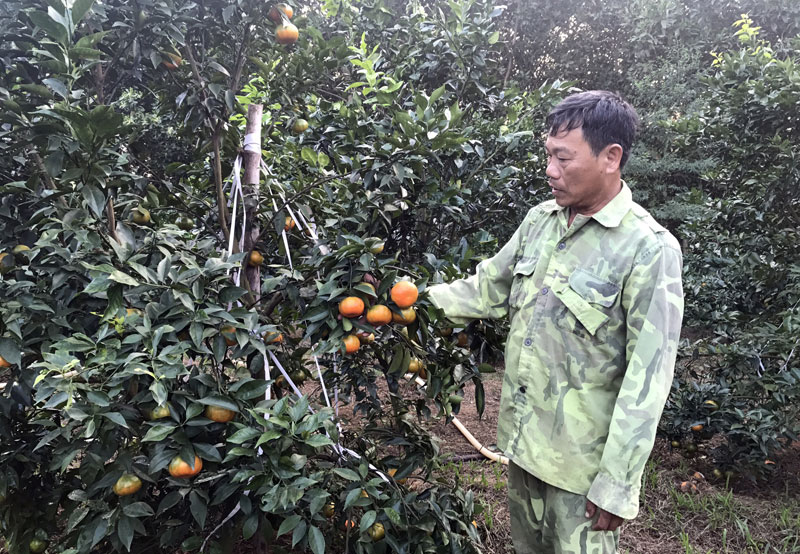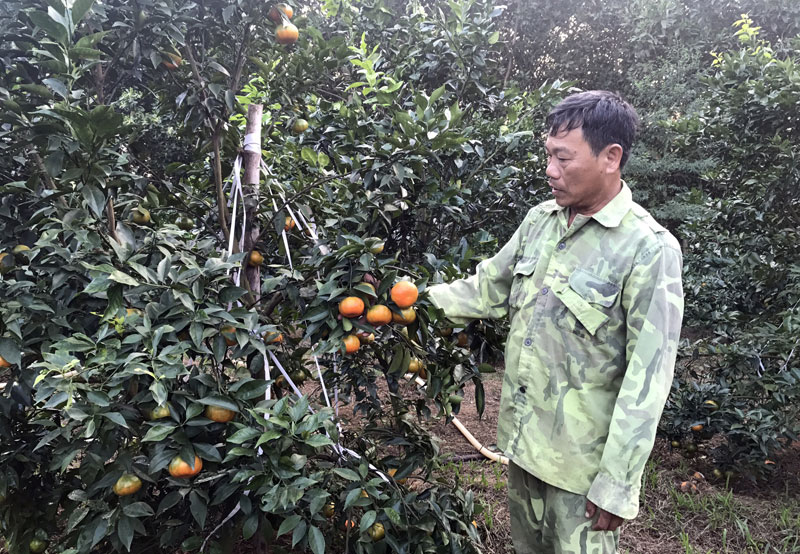
(HBO) In Hop Thinh commune (Ky Son), there have been more orange and pomelo gardens recently. Growing citrus trees in Hop Thinh commune is a new direction, creating a sustainable income, contributing to socio-economic development and firmly strengthening the criteria for building new rural areas.
Mr. Nguyen Van Quynh, Gieng hamlet, Hop Thinh commune (Ky Son) has renovated the mixed gardens to plant 5.5 ha of citrus trees based on VietGAP standards, bringing the high economic efficiency.
Citrus trees in Hop Thinh commune has been growing for the past 3 years. Starting from small households, it has now expanded to the whole commune with a total area of nearly 40 hectares. Particularly in 2018, the commune expanded the citrus growing area with a concentrated scale of 10 hectares, including different kinds of Canh oranges, V2 orange, oranges with yellow heart, Dien pomelos, green pomelos complied with VietGAP process, directing to the trade mark of the clean agricultural products with high quality. In 2018, some households also have harvested oranges with stable prices, bringing high economic efficiency, which is many times higher than other traditional crops.
Hai Cao and Gieng are two strong citrus tree growing villages with the area of 25 hectares. There are 24 households participating in citrus tree growing. The households who grow less has 2,000 - 3,000 m2, and those who grow more has 5 - 6 hectares. At the end of 2018, many orange and grapefruit orchards were harvested, bringing the revenue of hundreds of millions VND to the growers. Many households have boldly gone off and got ahead of the technology, after renovating the land, built a model of citrus planting according to VietGAP standards, thanks to the experienced households from famous orange growing areas such as Cao Phong and Lac Thuy to get the technical support. As a result, the harvested products with high quality and productivity are favored in the market.
Mr. Nguyen Van Quynh has the largest orange and pomelo garden in Gieng village with the area of 5.5 hectares. In 2015, he boldly borrowed money, renovated the mixed gardens, invested in seedlings, the sprinkler systems, built a model of citrus planting according to VietGAP standards. Mr. Quynh said: "In 2018 my family earned 80 million VND from selling Canh oranges.
According to data from the Hoa Binh Provincial Party Committee, the industrial production index for the first six months of 2025 is estimated to have increased by 20% compared to the same period last year. This marks the highest year-on-year growth rate for this period since 2020.
In the first six months of 2025, Hoa Binh province’s export turnover was estimated at 1.145 billion USD, marking an 18.11% increase compared to the same period in 2024. Import turnover was estimated at $ 804 million, a 17.15% increase, which helped the province maintain a positive trade balance.
The lives of the ethnic minority farmers in Tan Lac district have gradually improved thanks to the new directions in agricultural production. This is a testament to the collective strength fostered through the professional associations and groups implemented by various levels of the district’s Farmers’ Union.
With the motto the "product quality comes first,” after nearly one year of establishment and operation, Muong village’s Clean Food Agricultural and Commercial Cooperative, located in Cau Hamlet, Hung Son Commune (Kim Boi district), has launched reputable, high-quality agricultural products to the market that are well-received by consumers. The products such as Muong village’s pork sausage, salt-cured chicken, and salt-cured pork hocks have gradually carved out a place in the market and they are on the path to obtaining the OCOP certification.
In the past, the phrase "bumper harvest, rock-bottom prices" was a familiar refrain for Vietnamese farmers engaged in fragmented, small-scale agriculture. But today, a new spirit is emerging across rural areas of Hoa Binh province - one of collaboration, organisation, and collective economic models that provide a stable foundation for production.
Maintaining growing area codes and packing facility codes in accordance with regulations is a mandatory requirement for agricultural products to be eligible for export. Recently, the Department of Agriculture and Environment of Hoa Binh province has intensified technical supervision of designated farming areas and packing facilities to safeguard the "green passport" that enables its products to access international markets.



